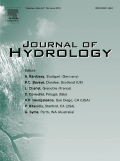
Journal of Hydrology
Scope & Guideline
Elevating Hydrological Insights to New Heights
Introduction
Aims and Scopes
- Hydrological Modeling and Forecasting:
Utilizes various modeling techniques, including machine learning and hybrid models, to predict hydrological processes such as streamflow, evaporation, and groundwater dynamics under changing climatic conditions. - Water Quality and Contamination Studies:
Investigates the impacts of human activities and natural processes on water quality, focusing on pollutants' sources, transport mechanisms, and their effects on aquatic ecosystems. - Climate Change and Hydrology:
Examines the effects of climate change on hydrological extremes, droughts, and water resource availability, providing insights for water management and policy adaptation. - Groundwater and Surface Water Interactions:
Studies the complex relationships between groundwater and surface water systems, including their responses to anthropogenic influences and natural variations. - Remote Sensing and Data Assimilation:
Employs advanced remote sensing technologies and data assimilation techniques to enhance the accuracy of hydrological models and improve water resource assessments. - Ecohydrology and Vegetation Dynamics:
Explores the interactions between hydrology and ecological systems, focusing on how vegetation influences water cycles and the implications for ecosystem services.
Trending and Emerging
- Machine Learning in Hydrology:
An increasing number of studies are utilizing machine learning techniques for hydrological modeling, data analysis, and prediction, reflecting a trend towards data-driven approaches. - Integrated Water Resources Management (IWRM):
There is a growing emphasis on IWRM, focusing on the interconnectedness of water, land, and energy resources, particularly in the context of sustainability and climate resilience. - Impact of Urbanization on Hydrology:
Research examining the effects of urbanization on hydrological processes, including runoff patterns and water quality, is gaining traction as cities face increasing flooding and water scarcity issues. - Hydrological Extremes and Climate Resilience:
Studies addressing the impacts of climate change on hydrological extremes, such as floods and droughts, are becoming more prevalent as societies seek to improve resilience. - Ecohydrological Approaches:
Research integrating ecological and hydrological perspectives to understand ecosystem responses to hydrological changes and to inform restoration practices is on the rise. - Use of Remote Sensing Technologies:
There is a notable increase in research employing remote sensing technologies for monitoring hydrological variables and assessing water resources, reflecting advancements in satellite capabilities.
Declining or Waning
- Traditional Hydrological Measurements:
Research utilizing conventional hydrological measurement techniques has decreased as newer technologies and remote sensing methods gain prominence. - Static Models for Water Resource Management:
There is a waning interest in purely static models, with a shift toward dynamic and adaptive modeling approaches that account for variability and change. - Historical Hydrology Studies:
The focus on purely historical analyses of hydrological data has diminished, with more emphasis being placed on predictive and scenario-based modeling. - Purely Theoretical Hydrological Frameworks:
Theoretical frameworks without empirical validation or practical application are less prevalent, as the journal emphasizes interdisciplinary and applied research.
Similar Journals

JOURNAL OF HYDROMETEOROLOGY
Charting New Territories in HydrometeorologyJOURNAL OF HYDROMETEOROLOGY, published by the American Meteorological Society, is a leading scholarly journal that serves as a vital resource within the field of atmospheric science. With its ISSN 1525-755X and E-ISSN 1525-7541, this journal provides a platform for the dissemination of high-impact research, currently holding a prestigious Q1 ranking in Atmospheric Science as per the 2023 Category Quartiles. It enjoys an excellent reputation, ranked #30 out of 148 in the Scopus listings, placing it in the top 80th percentile within Earth and Planetary Sciences. Publishing rigorous and innovative studies from 2000 to 2024 and beyond, the journal addresses critical topics including weather forecasting, climate dynamics, and hydrological processes, making it essential reading for researchers, professionals, and students alike. Though not an open-access journal, it continues to enrich the academic community with quality contributions dedicated to advancing our understanding of hydrometeorological phenomena.
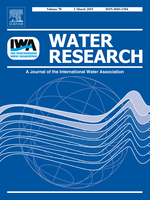
WATER RESEARCH
Empowering researchers to tackle urgent water issues.WATER RESEARCH, published by Pergamon-Elsevier Science Ltd, is a premier international journal dedicated to the advancement of knowledge in the interdisciplinary field of water science and technology. With a significant impact factor, WATER RESEARCH holds a distinguished position, consistently ranking in the top quartile (Q1) across multiple categories including Civil and Structural Engineering, Environmental Engineering, and Pollution. Established in 1967 and set to continue its legacy until at least 2024, this journal provides a vital platform for researchers and professionals to disseminate cutting-edge findings related to water sustainability, quality, and management. Although the journal follows a traditional access model, its commitment to disseminating impactful research ensures that it remains an essential resource for academia and industry alike. With a rigorous selection process, the journal includes articles that significantly contribute to the understanding and resolution of global water-related challenges, making it an invaluable asset for researchers, students, and practitioners engaged in this critical area of study.
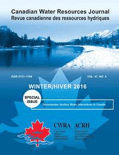
Canadian Water Resources Journal
Advancing sustainable solutions in water management.Canadian Water Resources Journal, published by Taylor & Francis Inc, is a leading academic journal dedicated to the field of water science and technology. With a significant history dating back to its inception in 1976, the journal offers a platform for high-quality, peer-reviewed research that addresses critical issues in water resources management, hydrology, water quality, and policy. The journal is recognized for its valuable contributions to the field, exemplified by its classification in the Q2 category for Water Science and Technology and holding a respectable rank of #137 out of 261 in the Scopus Environmental Science category. While it does not currently offer open access, its articles remain accessible through various institutional subscriptions, ensuring that professionals, researchers, and students stay updated with the latest advancements and discussions in water resources. As it converges towards its ongoing publication commitment through 2024, the Canadian Water Resources Journal remains an essential resource for those engaged in the pursuit of sustainable water management solutions.

Water Resources
Fostering scholarly dialogue on critical water issues.Water Resources, a prominent journal published by MAIK NAUKA/INTERPERIODICA/SPRINGER, focuses on the critical and evolving field of water science and technology. Established in 1976 and with a long-standing commitment to advancing knowledge, this journal explores interdisciplinary research that addresses the challenges surrounding water resource management, quality, and sustainability. With an impact factor positioned within the Q3 category of its field, it holds a notable Scopus rank (#181/261) in Environmental Science, emphasizing its role in driving scholarly discourse. While currently not open access, Water Resources provides vital insights for researchers, professionals, and students, making it an essential resource for those seeking to innovate and implement effective water management solutions. To stay ahead in a domain that is increasingly paramount to global sustainability efforts, consider engaging with the latest research published in this vital journal.
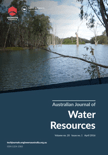
Australasian Journal of Water Resources
Pioneering Research in Water Science and TechnologyThe Australasian Journal of Water Resources, published by Taylor & Francis AS, stands as a pivotal resource in the field of water science and technology. With an ISSN of 1324-1583 and E-ISSN 2204-227X, this esteemed journal facilitates the dissemination of high-quality research articles that address critical issues facing water resources management across Australasia and beyond. Ranking in the Q2 category for Water Science and Technology as per the 2023 metrics, it boasts an impressive Scopus ranking of 75/261 in Environmental Science, placing it in the 71st percentile for its field. Spanning from 2008 to 2024, the journal emphasizes the importance of sustainable water practices, innovative technologies, and environmental policy, making it an invaluable asset for researchers, professionals, and students seeking to advance their knowledge and contribute to the discourse on water management challenges. The journal's rigorous peer-review process and commitment to open academic dialogue ensure that emerging trends and pioneering ideas receive the attention they deserve.
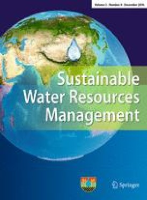
Sustainable Water Resources Management
Pioneering research for a water-secure future.Sustainable Water Resources Management is an esteemed journal focusing on the critical field of water resource management in the context of sustainability. Published by Springer International Publishing AG, this journal serves as a vital platform for researchers, policymakers, and practitioners to disseminate cutting-edge research and innovative practices aimed at addressing global water challenges. With an impressive impact factor aligned with its Q2 ranking in Water Science and Technology and Q3 in Renewable Energy, Sustainability, and the Environment, it maintains a robust reputation in its field, evidenced by its Scopus rankings. Covering a diverse range of topics from integrated water resource management to the nexus between water and energy, Sustainable Water Resources Management is committed to fostering knowledge exchange and encouraging interdisciplinary dialogue among its audience. This journal, operating under strict academic rigor, plays an essential role in advancing sustainable practices and is open from 2015 to 2024, making it a relevant resource in today’s rapidly evolving environmental context.

Journal of Applied Water Engineering and Research
Integrating Technology for Effective Water ManagementJournal of Applied Water Engineering and Research is a dynamic platform dedicated to the advancement of knowledge in the field of water science and technology. Published by Taylor & Francis Ltd, this journal aims to bridge the gap between theoretical research and practical applications in water engineering, providing a crucial resource for researchers, practitioners, and policymakers. With an ISSN of 2324-9676 and an impressive ranking in the Q3 category for Water Science and Technology, it occupies a distinctive position within the scholarly community. The journal covers a wide spectrum of topics, including innovative water management strategies, sustainable practices, and the integration of technology in water resource management, thus contributing significantly to the discourse surrounding environmental sustainability. With publication years converging from 2013 to 2024, the Journal of Applied Water Engineering and Research continues to foster impactful research, enhancing our understanding and management of vital water resources.

Journal of Hydrology-Regional Studies
Empowering research to transform hydrological practices.Journal of Hydrology-Regional Studies, published by ELSEVIER in the Netherlands, stands as a leading open-access platform since 2014 for disseminating high-quality research in the fields of hydrology and water management. With an impressive impact factor and recognition as a Q1 journal in both Earth and Planetary Sciences and Water Science and Technology categories, it emphasizes regional studies that advance understanding of hydrological processes and their implications for sustainable management practices. The journal has established a significant global reach, evident from its Scopus rankings, which place it in the top percentiles within its disciplines, fostering a dynamic exchange of ideas among researchers, professionals, and students alike. By mobilizing critical insights and innovative solutions in hydrology, this journal aims to contribute to solving the pressing water-related challenges faced by our society.

Water
Connecting researchers to tackle urgent water issues.Water, an esteemed journal published by MDPI, serves as a pivotal resource for global research in the fields of aquatic science, biochemistry, geography, and water science and technology. Since its inception in 2009, this open-access journal has committed itself to advancing knowledge regarding water-related topics by fostering a platform that encourages the dissemination of high-quality research. With its impressive impact factor reflecting its relevance and influence, Water ranks in the top quartiles in various categories, including Q1 in Aquatic Science and Water Science and Technology, showcasing its commitment to publishing cutting-edge findings that resonate deeply with the environmental and biological sciences community. Located in Basel, Switzerland, the journal prioritizes accessibility for researchers, professionals, and students alike, aligning with the broader scientific goal of addressing urgent water challenges through collaborative and interdisciplinary research.
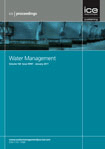
PROCEEDINGS OF THE INSTITUTION OF CIVIL ENGINEERS-WATER MANAGEMENT
Pioneering Research for a Sustainable Water FuturePROCEEDINGS OF THE INSTITUTION OF CIVIL ENGINEERS-WATER MANAGEMENT is a prestigious journal published by Emerald Group Publishing Ltd, dedicated to advancing the field of water management within civil engineering. With an ISSN of 1741-7589 and an E-ISSN of 1751-7729, this journal delivers peer-reviewed research that spans the critical intersections of water science and technology, contributing valuable insights into sustainable water management practices. As evidenced by its ranking in the 2023 Scopus categories, where it holds the Q3 quartile in Water Science and Technology, and a respectable position among its peers, the journal remains a vital resource for researchers, professionals, and students in the field. Though it is not an open-access journal, it offers accessible subscription options that facilitate worldwide dissemination of knowledge, enhancing its role as a fundamental reference point for cutting-edge developments in water management. For those looking to publish or stay updated on the latest research trends, this journal serves as an essential platform for promoting innovation and sustainable practices in civil engineering and water resources management.